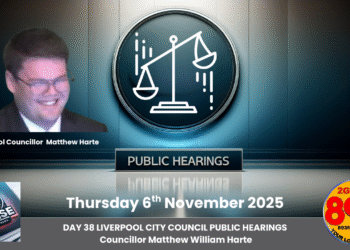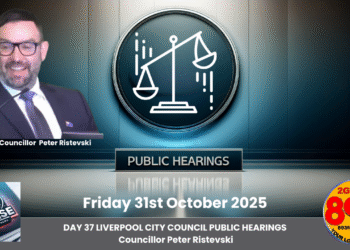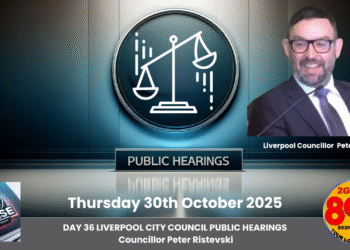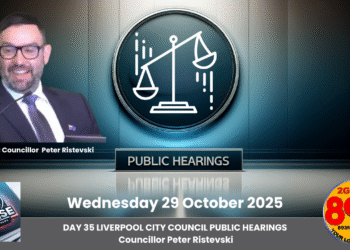On Tuesday, 28 October 2025, the Public Inquiry into Liverpool City Council, commissioned under Section 438U of the Local Government Act 1993 (NSW), held its 34th day of public hearings in Sydney. The session commenced at 10:03 AM and featured continued testimony from Councillor Fiona Macnaught, focusing on council challenges, achievements, meeting dynamics, training for councillors, and communication practices among councillors. Below is a factual summary of the day’s events, followed by an analysis of matters arising that would interest ratepayers, framed around the question: Are ratepayers getting good value for money?
Summary of Proceedings
Councillor Fiona Macnaught’s Testimony
- Challenges Facing the Council: Councillor Macnaught, re-sworn after a previous appearance, outlined short-to-medium term challenges for Liverpool City Council over the next 6 to 18 months. She highlighted financial constraints common to local councils, such as cost-shifting and the need for sustainable budgeting without relying solely on rate increases. She suggested exploring innovative approaches like maximizing property portfolios to achieve financial stability.
- Council Achievements: Macnaught emphasized positive council initiatives, including award-winning staff and programs, upcoming projects like a new mountain bike track, successful events and tourism awards for the Liverpool Powerhouse restaurant, community programs at the library (e.g., free HSC tutoring by the youth council), and state-recognized multicultural events in the CBD. She noted these achievements are often overshadowed by negative narratives during the inquiry.
- Council Meeting Dynamics: Reflecting on her tenure since the 2021 election, Macnaught observed that council meetings can be challenging due to a lack of respect from some councillors, leading to protracted and boisterous discussions despite efforts to maintain order. She attributed this to overzealousness or other personal motivations but acknowledged that decisions are still reached.
- Training and Preparedness: Macnaught discussed the training received on the Code of Meeting Practice during induction, noting its complexity and her reliance on observation and occasional CEO guidance while chairing as deputy mayor. She strongly supported enhanced, hands-on training (e.g., role-play, mock sessions) for all councillors, especially for mayors and deputy mayors, to build confidence in managing meetings. She also endorsed practical guidance on crafting notices of motion and understanding code of conduct interpretations through Q&A sessions, viewing current training as insufficient due to timing and depth.
- Communication Practices: Questioning revealed Macnaught’s participation in a WhatsApp group for Liberal-affiliated councillors, which includes non-councillor Betty Boustani. While she couldn’t recall specific discussions, she admitted the group might discuss notices of motion, council agenda items, or business, and she likely received messages during meetings (e.g., the 26 February 2025 meeting on the aerotropolis conference). She saw no issue with Boustani’s inclusion, asserting discussions were not inappropriate.
- CEO Recruitment Panel and Confidentiality: Parts of the testimony moved to a private session (10:24 AM to 10:36 AM) to address prior closed-session evidence on a CEO recruitment meeting on 20 February 2025, due to existing non-publication orders. In open session, Macnaught confirmed a new panel was formed post-meeting, including herself, Mayor Mannoun, and Councillor Ristevski, and noted they worked well together despite known tensions.
Matters Arising of Interest to Ratepayers: Are Ratepayers Getting Good Value for Money?
Ratepayers of Liverpool City Council are concerned about whether their contributions result in effective governance and tangible community benefits. The following matters from Day 34 of the inquiry highlight areas where value for money is in question:
- Governance and Council Efficiency:
- Disorder in Meetings: Councillor Macnaught’s observation of a disrespectful tone and boisterous behavior during council meetings suggests inefficiencies that prolong decision-making. If ratepayer-funded meetings are disrupted by a lack of order, the value of time and resources spent on governance diminishes, potentially delaying or compromising community-focused outcomes.
- Inter-Councillor Communication: The use of a WhatsApp group for Liberal-affiliated councillors, including during meetings, raises concerns about transparency and fairness in decision-making. The inclusion of non-councillor Betty Boustani in discussions potentially related to council business could undermine public trust. Ratepayers may question if their money supports a council where private communications influence public decisions, reducing accountability.
- Training and Councillor Preparedness:
- Inadequate Training Programs: Macnaught’s support for enhanced, practical training on the Code of Meeting Practice, notices of motion, and code of conduct highlights current deficiencies in councillor preparation. If ratepayer-funded training fails to equip councillors with essential skills to manage meetings or adhere to conduct standards, governance quality suffers, questioning the value of resources allocated to such programs.
- Impact on Performance: Her reliance on ad-hoc guidance (e.g., from the CEO) and lack of familiarity with recent guidelines like the June 2025 free speech publication from the Office of Local Government indicate gaps in ongoing education. Ratepayers may not receive full value if councillors are not consistently updated or trained to handle complex roles, risking errors or misconduct that could incur further costs.
- Financial Management and Community Benefits:
- Financial Challenges: Macnaught’s acknowledgment of ongoing budget constraints and cost-shifting pressures, alongside a need for innovative revenue strategies beyond rate hikes, signals potential fiscal strain. While she highlighted achievements like community events and infrastructure, ratepayers may question if their money is optimally used when financial sustainability remains uncertain, potentially affecting service delivery or future rate burdens.
- Recognition of Achievements: Her point that positive council initiatives (e.g., award-winning programs, library services) are under-celebrated due to the inquiry’s focus on negatives suggests a communication gap. Ratepayers may feel they are not getting full value if the council fails to effectively showcase how their contributions translate into community benefits, impacting trust and perceived return on investment.
Conclusion
The Day 34 proceedings of the Public Inquiry into Liverpool City Council reveal critical challenges in governance efficiency, councillor training, and financial communication that affect whether ratepayers are receiving good value for their money. Disorderly council meetings and potentially inappropriate communication practices via WhatsApp suggest inefficiencies and transparency issues that could divert focus from community needs. Inadequate training further risks councillor performance, while financial pressures and under-communicated achievements may erode trust in resource allocation. Ratepayers deserve assurance that their contributions fund a well-managed, transparent council delivering clear benefits, yet evidence from this hearing indicates areas where value for money remains uncertain. As the inquiry progresses, these issues require attention to ensure improvements at Liverpool City Council.



























